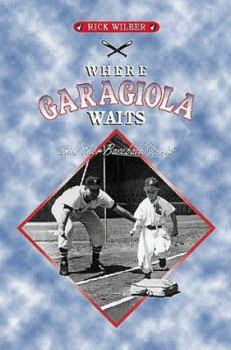Where Garagiola Waits
Select Format
Select Condition 
Book Overview
No Synopsis Available.
Format:Hardcover
Language:English
ISBN:1879852616
ISBN13:9781879852617
Release Date:January 1999
Publisher:University of Tampa Press
Length:167 Pages
Customer Reviews
2 ratings
What good stuff
Published by Thriftbooks.com User , 24 years ago
Wilber's words move swiftly and smoothly and allow the reader to savor the magic of the story. He manages to turn fantasy into reality and make reality seem a whole lot better than it is. He brings people like Lou Gehrig, Babe Ruth and Stephen Crane back to life in such a way that it seems he's had a close relationship with all of them. Each story carries a sense of genuine authenticity that no ordinary writer can possess.Wilber's portrayal of "The Game," as he calls it, will appeal to baseball fans and nonfans alike. He doesn't get too technical nor does he omit important baseball details. "Where Garigiola Waits" really does have something for everyone.
Writer illumines baseball and the human heart
Published by Thriftbooks.com User , 25 years ago
With his first book of stories and essays Rick Wilber demonstrates again, for those who need further proof, that baseball is our most literary sport, producing more good writing than all other sports combined. In these stories Wilber's love of baseball is clear, though he does not unduly sentimentalize the game. You won't hear the strains of "Take Me Out to the Ball Game" as you read. This is no five-hanky Ken Burns tearjerker., but the work of a serious (though not solemn) writer. Those looking for intelligent appreciation of baseball will find it here. But it will also repay those in search of what good fiction has always provided, a look at the human heart at work. The game is always there. Part of the very connective tissue of Wilber's men characters. They would miss it terribly is they weren't playing, even at the humble amateur level at which they're competing. But the game, important as it is, lacks the power to heal. These guys, and the women and family members who love them, must deal with their sea of troubles by other means. Much of Wilber's early stories are science fiction and fantasy, appearing in such publications as "Asimov's Science Fiction" and "Magazine of Fantasy and Science Fiction." So it's no surprise when Wilber plays fast and loose with time in the title story. This allows him to deal with regret and with one of the longest running and fondest human fantasies, going back in time to get a second chance to do something right. Even with the time tirck, "Where Garagiola Waits" is not slick genre fair. Real time will tell whether it's literature, but we can say right now that it's a good story. An elderly man, justifiably guilt-ridden about much that's gone wrong in his and his wife's life thanks to his weaknesses, gets another chance at a career in the bigs and another chance to do better by a woman he clearly loves. A voyage worth going on even for those who have no clue who Joe Garagiola is or why he would be waiting for anyone. "Run Down West" is a poignant story of a man's guilt over a youthful impetuosity, a family's loss, and the hope to be found in yet another generation. In "Sixty Feet and Sinking" (first published in SPTBALL), a lonely man and a lonely father learn more about each other. In "Straight Changes" a departed father returns to help call pitches for his amatuer pitcher son who himself has a son with Down's Symdrone, a truly strange girlfriend, and more troubles than just getting batters out. In "Stephen to Cora to Joe" writer and college baseball player Stephen Crane shows up in, you guessed it, an open boat. "Bridging" is in straight time, but shows a man getting a second chance to do what he thinks a man should do. Baseball fans will likely have the most fun with "The Babe, The Iron Horse, and Mr. McGillicuddy," co-written with novelist Ben Bova. Resorting to the time shuffle again, Wilber and Bova get Babe Ruth, Lou Gehrig, Ty Cobb into the sa





